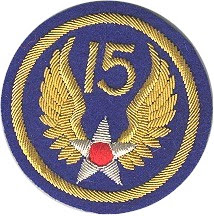 Often overshadowed by the Eighth Air Force, the Fifteenth Air Force distinguished itself in combat over Europe and deserves far, far more recognition than it has received.
Often overshadowed by the Eighth Air Force, the Fifteenth Air Force distinguished itself in combat over Europe and deserves far, far more recognition than it has received.Sixty-four years ago today, B-24 Liberator bombers of the 15th Air Force carried out one of the most daring bombing missions of World War Two, the low-level raid on Ploesti. The goal-to knock out Nazi oil production. The raid succeeded in temporarily crippling the Nazi war maching, which ran on oil. Some historians believe that had the Air Corps continued its focus on Big Oil and not on ground support as advocated by Gen. Eisenhower, the war might have ended sooner. Be that what it may, this mission will live forever in the history of World War Two air battles.

The Ploesti Raids
While Allied and Axis forces were battling in Sicily, the AAF staged one of the war's most daring heavy bomber raids. The target was the Ploesti oil fields in Rumania, estimated to be supplying 60% of Germany's crude oil requirements.
Shortly after dawn on August 1, 1943, AAF B-24s took off from bases in Libya and headed toward the heavily defended target, deep inside enemy territory a thousand miles away. Over Bulgaria, clouds broke up the B-24 formations and the bombing elements became widely separated. Tracked by German radar which alerted Rumanian defenses, the B-24s arrived over the target at treetop height without the planned element of surprise.
Despite intense defensive fire from the ground and from the Axis planes, the AAF pressed the attack. In the confusion of battle, some B-24s made bombing runs through heavy smoke over targets that had already been attacked and were caught in the bursts of delayed action bombs dropped several minutes previously. Although overall damage to the target was heavy, the cost was high. Of 177 planes and 1,726 men who took off on the mission, 54 planes and 532 men failed to return.
Excerpt from the book,"The Ploesti Raid, Through the Lens."By Roger A. Freeman:
So wrote Maj. Gen. Lewis Brereton , the US Ninth Air Force commander in the Middle East, as the planners contemplated the options of a high or low level attack on the oil refineries at Ploesti in Rumania.
If this source of 40 per cent of Germany's oil could be eliminated, it would deal a vital body-blow to the Third Reich's ability to wage war, and a surprise attack by heavy B-24 Liberators flying at tree-top height was considered the best method of achieving success.
Three bomb groups from the Eighth Air Force based in Britain flew out to join two groups of the Ninth already in North Africa, the combined force of 179 aircraft destined to carry out the first massed low-level heavy bomber mission in history.
The Ploesti Raid took place on Sunday, August 1, 1943 and, but for a navigational error which put the leading formation on a course away from the target, the operation might have resulted in the destruction of the seven chosen targets. However, by the time the mistake was realised, the defences were on the alert and over 20 Liberators were brought down in and around Ploesti. A further 35 aircraft were lost.
 Lest we ever forget. God bless the Ploesti Airmen.
Lest we ever forget. God bless the Ploesti Airmen.

The Ploesti Raids
1943/08/14
While Allied and Axis forces were battling in Sicily, the AAF staged one of the war's most daring heavy bomber raids. The target was the Ploesti oil fields in Rumania, estimated to be supplying 60% of Germany's crude oil requirements.
Shortly after dawn on August 1, 1943, AAF B-24s took off from bases in Libya and headed toward the heavily defended target, deep inside enemy territory a thousand miles away. Over Bulgaria, clouds broke up the B-24 formations and the bombing elements became widely separated. Tracked by German radar which alerted Rumanian defenses, the B-24s arrived over the target at treetop height without the planned element of surprise.
Despite intense defensive fire from the ground and from the Axis planes, the AAF pressed the attack. In the confusion of battle, some B-24s made bombing runs through heavy smoke over targets that had already been attacked and were caught in the bursts of delayed action bombs dropped several minutes previously. Although overall damage to the target was heavy, the cost was high. Of 177 planes and 1,726 men who took off on the mission, 54 planes and 532 men failed to return.

Excerpt from the book,"The Ploesti Raid, Through the Lens."By Roger A. Freeman:
"If it is granted that the successful destruction of the target would warrant the possible expenditure of the entire force. . . . ."
So wrote Maj. Gen. Lewis Brereton , the US Ninth Air Force commander in the Middle East, as the planners contemplated the options of a high or low level attack on the oil refineries at Ploesti in Rumania.
If this source of 40 per cent of Germany's oil could be eliminated, it would deal a vital body-blow to the Third Reich's ability to wage war, and a surprise attack by heavy B-24 Liberators flying at tree-top height was considered the best method of achieving success.
Three bomb groups from the Eighth Air Force based in Britain flew out to join two groups of the Ninth already in North Africa, the combined force of 179 aircraft destined to carry out the first massed low-level heavy bomber mission in history.
The Ploesti Raid took place on Sunday, August 1, 1943 and, but for a navigational error which put the leading formation on a course away from the target, the operation might have resulted in the destruction of the seven chosen targets. However, by the time the mistake was realised, the defences were on the alert and over 20 Liberators were brought down in and around Ploesti. A further 35 aircraft were lost.
 Lest we ever forget. God bless the Ploesti Airmen.
Lest we ever forget. God bless the Ploesti Airmen.





3 comments:
knicksgirl, I'm glad your spam is more important to you than what these airmen did 63 years ago.
We've been dealing with this kind of garbage over at the 100th message board too - regarding the spam.
Back to the topic - God Bless the heroes of the Ploesti Raid. This is a job that no human being should have been asked to do, but these heroes did it. There is no end to the courage of our Greatest Generation.
Post a Comment